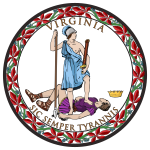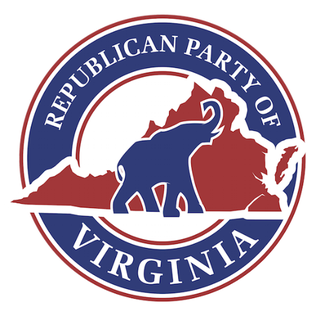
The Republican Party of Virginia (RPV) is the Virginia chapter of the Republican Party. It is based at the Richard D. Obenshain Center in Richmond. As of May 2024, it controls all three statewide elected offices and 5 out of 11 U.S. House seats.
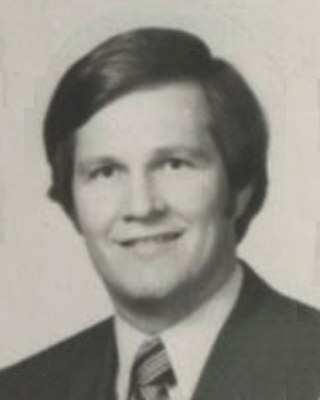
Nathan Huff Miller is an American lawyer and political figure from the Commonwealth of Virginia. A Republican, he served in both houses of the Virginia General Assembly. He is currently the managing partner of Harrisonburg law firm Miller, Earle & Shanks.
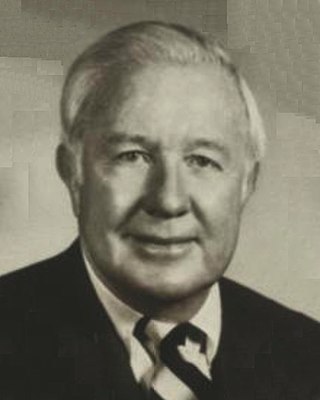
Richard Joseph Davis Jr. was the 34th Lieutenant Governor of Virginia from 1982 to 1986 serving under Governor Chuck Robb. A former mayor of Portsmouth, Virginia, Davis' 1981 election as Lieutenant Governor saw him win 8 of the 10 Congressional Districts composing Virginia in 1981; his statewide margin of victory over Republican state senator Nathan H. Miller was 150,000 votes. In 1982, Davis ran for the United States Senate, but lost to Republican candidate Paul S. Trible Jr.

John James Davis was an American attorney and politician who helped found West Virginia and later served as a United States representative in Congress from that state.

The 1989 Virginia gubernatorial election was held on November 7, 1989. Incumbent Democratic governor Jerry Baliles was unable to seek a second term due to term limits. Democratic nominee and Lieutenant Governor L. Douglas Wilder went against former attorney general of Virginia J. Marshall Coleman in one of the closest elections in Virginia history. Upon taking the oath of office in January 1990, Governor Wilder became the first African-American governor of Virginia, and the first African-American governor of any state since Reconstruction more than one hundred years earlier.

The 2008 congressional elections in Virginia were held on November 4, 2008, to determine who would represent the Commonwealth of Virginia in the United States House of Representatives, coinciding with the presidential and senatorial elections. Representatives are elected for two-year terms; those elected served in the 111th Congress from January 3, 2009, until January 3, 2011. Primary elections were held on June 10, 2008.

The 1998 California lieutenant gubernatorial election occurred on November 3, 1998. The primary elections took place on June 2, 1998. State Assemblyman and Speaker of the Assembly Cruz Bustamante, the Democratic nominee, decisively defeated the Republican nominee, State Senator Tim Leslie, to succeed the incumbent Gray Davis, who chose not to seek re-election in favor of running for governor.

West Virginia's 2012 general elections were held on November 6, 2012. Primary elections were held on May 8, 2012.
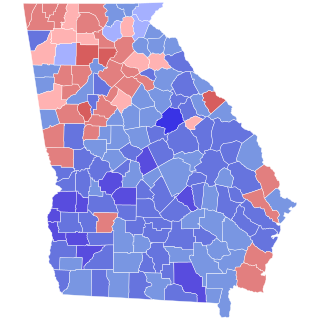
The 1998 Georgia gubernatorial election was held on November 3, 1998. Incumbent Democratic governor Zell Miller was unable to seek re-election due to term limits, therefore creating an open seat. To replace him, State Representative Roy Barnes won the Democratic Party's nomination after a close and highly contested primary election, while businessman Guy Millner, who had run for governor and the United States Senate in the previous four years, won the nomination of the Republican Party.

In the 1985 Virginia gubernatorial election, incumbent Governor Chuck Robb, a Democrat, was unable to seek re-election due to term limits. Jerry Baliles, the Attorney General of Virginia, was nominated by the Democratic Party to run against the Republican nominee, Wyatt B. Durrette. This is the most recent time the Democratic candidate won a gubernatorial race in Virginia with a double-digit margin of victory.

The following offices were up for election in the United States Commonwealth of Virginia in the November 5, 2013 general election.

The 1982 Alaska gubernatorial election took place on November 2, 1982, for the post of Governor of Alaska. To replace outgoing Republican governor Jay Hammond, Democratic nominee Bill Sheffield defeated three opponents: Republican nominee Tom Fink, Libertarian nominee Dick Randolph and Alaskan Independence Party nominee Joe Vogler. Hammond had endorsed his lieutenant governor, Terry Miller, who lost the Republican nomination to Fink in the primary election, as did Don Wright. Sheffield defeated Steve Cowper and former Lieutenant Governor H. A. Boucher for the Democratic nomination.

The 2014 Kansas gubernatorial election took place on November 4, 2014, to elect the governor of Kansas, concurrently with the election of Kansas' Class II U.S. Senate seat, as well as other elections to the United States Senate in other states and elections to the United States House of Representatives and various state and local elections.

The 2013 Virginia lieutenant gubernatorial election took place on November 5, 2013, to elect the Lieutenant Governor of Virginia. The incumbent Lieutenant Governor, Republican Bill Bolling, had originally planned to run for Governor of Virginia in the 2013 gubernatorial election, but withdrew upon the entry of Attorney General Ken Cuccinelli.

The 1978 United States Senate election in Virginia was held on November 7, 1978. Incumbent Republican Senator William L. Scott did not run for re-election to a second term. Republican former Secretary of the Navy John Warner narrowly defeated Democratic Attorney General of Virginia Andrew P. Miller to succeed him. Originally, this election was a match between Republican Richard Obenshain and Miller, then Obenshain died in a plane crash, leaving the party in disarray. Warner was then nominated to run in Obenshain's place, and his victorious election thrust him into a thirty-year career in the United States Senate, which started with this election.

In the 1981 Virginia gubernatorial election, Republican incumbent Governor John N. Dalton was unable to seek re-election due to term limits. Chuck Robb, the Lieutenant Governor of Virginia, was nominated by the Democratic Party to run against the Republican nominee, state Attorney General J. Marshall Coleman.

The 1940 United States Senate election in Missouri was held on November 5, 1940. Incumbent Democratic U.S. Senator and future President of the United States Harry S. Truman, who was first elected in 1934, decided to seek re-election to a second term. He narrowly survived a primary challenge from Governor of Missouri Lloyd C. Stark before also narrowly defeating Republican nominee Manvel H. Davis in the general election.

In the 1977 Virginia gubernatorial election, incumbent Governor Mills E. Godwin, Jr., a Republican, was unable to seek re-election due to term limits. John N. Dalton, the Lieutenant Governor of Virginia, was nominated by the Republican Party to run against the Democratic nominee, former Lieutenant Governor of Virginia Henry Howell.

The 2017 Virginia lieutenant gubernatorial election was held on November 7, 2017. After the party primary elections were held, the major party nominees were Jill Vogel (Republican) and Justin Fairfax (Democrat). The incumbent Lieutenant Governor, Democrat Ralph Northam, declined to run for re-election in order to run for Governor. In the general election on November 7, 2017, Democratic nominee Justin Fairfax defeated Republican state Senator Jill Vogel to become the 41st Lieutenant Governor of Virginia.

The 1997 Virginia lieutenant gubernatorial election was held on November 4, 1997. Republican nominee John H. Hager defeated Democratic nominee Lewis F. Payne Jr. with 50.16% of the vote.

